11. THE "MODERNIZING" OF THE WEST

THE URGE TO RATIONALIZE AND CONTROL SOCIAL DYNAMICS
CONTENTS
 Jeremy Bentham Jeremy Bentham
 August Comte August Comte
 John Stuart Mill John Stuart Mill
 Darwinism Darwinism
 Nietzsche Nietzsche
 The assault on Christian morality The assault on Christian morality
 Marxism Marxism
The textual material on page below is drawn directly from my work
A Moral History of Western Society © 2024, Volume One, pages 442-453.
A Summary of this Section
Jeremy Bentham (1748-1832), as a
British Liberal or "Utilitarian," sees the greatest happiness of the greatest number of people as the only measure of right and wrong.
However, he believes that only through proper moral discipline
this could all come about
August Comte (1798-1857) was
something of a French pragmatist (like the British) ... a "Positivist" – not persuaded by pure rationalism but instead by "scientific"
study – the source of "Progressivism."
John Stuart Mill (1806-1873)
develops his own Positivism – seeing life improved through careful intellectual development ... not by government officials but
through personal development.
But the context of that development must be carefully shaped
... including a religion that leads a person to higher thought.
Such thinking becomes the basis for the British Liberal Party's
role in British society.
Charles Darwin (1809-1882) –
through his own biological research gives support to the growing Malthusian view that the strongest should most naturally lead society and allow the weak to simply fall away
... an idea actually begun by his grandfather, Erasmus, who published (1796)
Zoonomia on biological evolution.
Darwin's 1859 On the Origin of Species seems to lock
biological evolution in place as absolute truth.
His 1871 Descent of Man also locks in place the idea as
man evolved from a simple primate (something of the "monkey" family).
Herbert Spencer (1820-1903)
popularizes Darwinism even further.
Friedrich Nietzsche (1844-1900) is supportive of similar intellectual development – in the creation of the superior individual (the
Ubermensch) ... not some superor social group or nation in the Hitlerian sense of Ubermensch ...and is contemptuous of Christianity (teaches "commonness"), Heaven (no
proof) and God ("dead")
Karl Marx (1818-1883) sees
nationalist struggle as highly diversionary ... from the real class
struggle – between the wealthy owners and the impoverished creators of
society's fruits ... the coming phase of that struggle taking the form of industrial workers (the proletariat) rising
up against industrial owners (the capitalists)
He was hoping that the 1848
uprisings were the signal for this workers' revolution – publishing his Communist Manifesto in support of just
such an uprising ... and getting him in more political trouble and forcing him to move to London in 1849.
There he undertakes to make his
theories "scientific" in a Darwinian way ... history "proving" such
social evolution (his two-volume Das Kapital – published in 1867 and 1885)
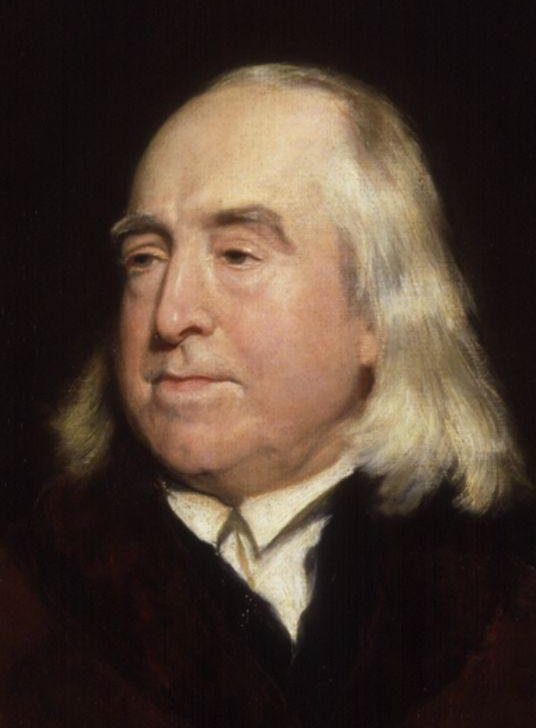 Bentham's Utilitarianism.
Going back a bit in our narrative, it is important to mention the
legacy that Bentham (1748-1832) had on the development of British
social thinking at the end of the 1700s and beginning of the 1800s. Bentham's Utilitarianism.
Going back a bit in our narrative, it is important to mention the
legacy that Bentham (1748-1832) had on the development of British
social thinking at the end of the 1700s and beginning of the 1800s.
Bentham is considered to be the founder of British Utilitarianism ... a
philosophy built simply on the idea that "the greatest happiness of the
greatest number is the true measure of right and wrong." In
short, he was a strong advocate in favor of "human rights."
He was highly opposed to slavery, believed in equal rights for women,
was a strong advocate of the separation of church and state, was
opposed to physical punishment, and believed strongly that there should
be no restrictions on speech. He even supported the idea of
animal rights. But he spent his greatest energies on the matter of
prison reform. In short, he was a very "modern" philosopher and
jurist!
But he did not believe that all of these came simply by lifting
traditional Christian moral standards ... as if these "human rights"
would come into place on their own in a rather natural manner (as did
Marx and other philosophers that came after him). To him, human
rights would come only through proper moral and political reform of
society ... enlightened social reform – principally by enlightened
public authority. In short, under British utilitarianism, the
primary role of government was to oversee the process of human progress.
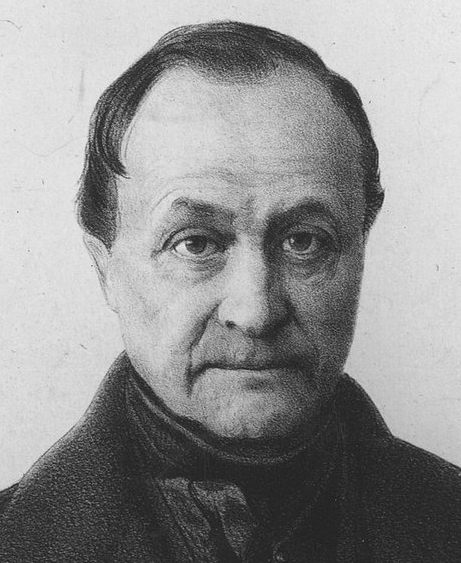 The
Frenchman Auguste Comte (1798-1857) reacted to the sometimes wild
speculation of French rationalists, who during the previous century had
built their philosophical theories on "reasonable" propositions –
rather than on the observation of actual phenomena. In short, he
introduced British empiricism to French or continental philosophy,
terming his approach "positivism." The
Frenchman Auguste Comte (1798-1857) reacted to the sometimes wild
speculation of French rationalists, who during the previous century had
built their philosophical theories on "reasonable" propositions –
rather than on the observation of actual phenomena. In short, he
introduced British empiricism to French or continental philosophy,
terming his approach "positivism."
He was particularly interested in seeing social philosophy built on
very careful observation of actual social behavior rather than mere
rationalist speculation ... such as Rousseau's social theories a
half-century earlier, which had helped push France towards the tragedy
of its recent Revolution. Thus Comte laid the groundwork for the
field of modern sociology with its demand for "factual" foundations for
all assertions of truth.
In his major six-volume work, Course of Positive Philosophy (published
in the period 1830-1842), he stated that human knowledge began in its
primitive stage as theology, or laying all events at the feet of divine
forces or God (related to the Divine rights claims of monarchical
authority). The next stage, the rationalist or philosophical
stage, was then characterized by broad abstract principles as the
foundation of truth or knowledge (he had in mind the rhetoric of
Revolutionary France). But the rising stage that the world found
itself entering at this point (a pragmatic, bureaucratic
post-Revolutionary France) would now be built on the works of
scientific scholars who would direct society through their knowledge of
actual fact-based science.
Most interestingly, none of Comte's Positivism or Progressivism itself
was itself based on the empirical methods he called for in his study –
but was instead a continuation of the French rationalist approach to
knowledge!
Nonetheless his ideas would catch the imagination of 19th century
Europe and help move it toward the notion that all truth is built on
fact and fact alone.
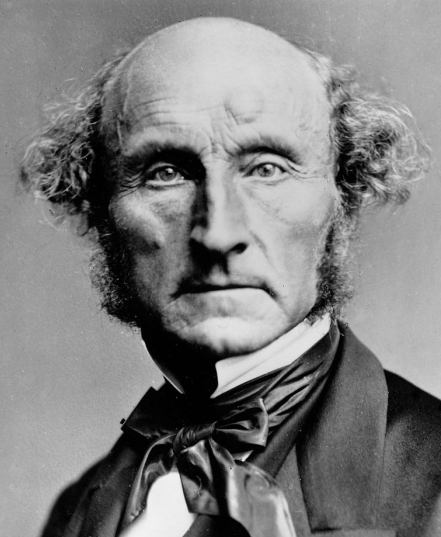 Mill
(1806-1873) was an amazing child prodigy, reading classic Greek
literature (from Aesop to Plato) by age 8, then a full array of Latin
and Greek works by age 10 ... plus history, math, physics and
astronomy. In all of this, he was carefully "home schooled" –
pruned and protected in his infancy and youth by his father, James Mill
– in order that the son would be "associated" only with the sharpest
minds (his father's and that of the family friend Jeremy Bentham) ...
and not with lower social orders of his own age ... a key part of the
educational philosophy of the British "Positivist" movement. His
father's goal was to grow his son into "a bright light of Utilitarian
philosophy that might light the world." In part the father
succeeded, though at a deeply heavy emotional and spiritual cost to the
son. Mill
(1806-1873) was an amazing child prodigy, reading classic Greek
literature (from Aesop to Plato) by age 8, then a full array of Latin
and Greek works by age 10 ... plus history, math, physics and
astronomy. In all of this, he was carefully "home schooled" –
pruned and protected in his infancy and youth by his father, James Mill
– in order that the son would be "associated" only with the sharpest
minds (his father's and that of the family friend Jeremy Bentham) ...
and not with lower social orders of his own age ... a key part of the
educational philosophy of the British "Positivist" movement. His
father's goal was to grow his son into "a bright light of Utilitarian
philosophy that might light the world." In part the father
succeeded, though at a deeply heavy emotional and spiritual cost to the
son.
Utilitarianism, Positivism, or Liberalism – all amounted to pretty much
the same thing: holding the common view that a person is born
with no a priori thoughts or abilities ... but as a thinking creature
is simply the result of careful development by guiding hands –
hopefully ones that care deeply for the happiness of those in their
care. It was all very personal. Liberals (both Americans
and British, from Jefferson to the Mills) viewed with great distrust
the intervention of public authorities in this process. In short,
"the best government is the one that governs the least!" This
would be a central tenet of Mill's Utilitarian or Liberal philosophy.
The understanding was that simply a person becomes what the surrounding
world brings to that person ... nothing more, nothing less.
Therefore that surrounding world – physical as well as social – must be
carefully shaped, engineered, protected. But this must be carried
out on a personal or individual basis ... not on a public or
Socialistic basis. Personal freedom was essential to proper development.
Thus it was that Mill would later reject deeply the ideas of his former
mentor, Bentham. Mill would disagree strongly with Bentham that
social progress would come best through the process of well-constructed
government action … Mill holding to the later developing idea that
social progress would fare better under personal or private development
than under official governmental action … which to subsequent British
Liberals was central to their idea of the critical importance of
personal freedom.
However ... Mill was closely connected with the British administration
of India – being a high-ranking official from 1823 (at age 17!) all the
way to the end of the East India Company in 1858. In this matter,
he would, take a broader view of the responsibilities that fell to
"more enlightened" social hands in face of a "barbarian" society.
Something akin to social action or "benevolent despotism" would be
required under such circumstances ... but must be carefully conducted
so as to benefit and not just merely subdue such a barbarian society.
And as far as an issue under much discussion at the time, Mill felt
that religion was the highly laudable ability of human thought to rise
above the merely physical or natural condition of life to contemplate
and be moved by ideals of excellence. But whether there was a
supreme Deity or consciousness to which human thought draws itself – or
which energizes the forces of life as Creator and Sustainer – was a
most uncertain proposition for Mill.
In any case, the very simplicity and the very attractiveness of
Utilitarian or Positivist "Liberalism" would catch on widely in the
fast-changing political setting of 19th century Britain. And
Mill, with his many publications, would be one to give great clarity
and appeal to this idea ... also helping to make the British Liberal
Party a growing force in British politics.
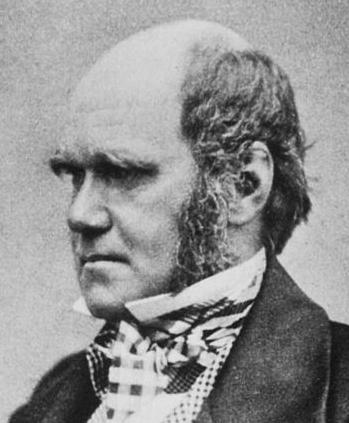 When
in 1859 Charles Darwin (1809-1882) published his book, On the Origin of Species – the
culmination of years of research and earlier publications – he shook
the moral foundations of Western civilization. This occurred not
because Darwin invented a new worldview out of thin air. The
ideas of progress through social struggle were by this time rather
widely accepted. The British Whig party, in fact, was built on
this idea: that Britain should be run by those proven strongest
in life's competition and that no tears should be wept for the poor
swept aside by life's struggles, because that would only hinder human
progress. When
in 1859 Charles Darwin (1809-1882) published his book, On the Origin of Species – the
culmination of years of research and earlier publications – he shook
the moral foundations of Western civilization. This occurred not
because Darwin invented a new worldview out of thin air. The
ideas of progress through social struggle were by this time rather
widely accepted. The British Whig party, in fact, was built on
this idea: that Britain should be run by those proven strongest
in life's competition and that no tears should be wept for the poor
swept aside by life's struggles, because that would only hinder human
progress.
No, it was not the newness of Darwin's ideas that made his works so
spectacular, but it was because he gave such precise explanation – and
justification – to these Whiggish ideas. His great contribution
to this debate of worldviews was that he built his Darwinist theory of
life on a vast field of scientific evidence, something that had by that
time become the absolute requirement for any claim to Truth.
Also, he was building his ideas on a well-established base of earlier works on this matter of evolution.
Robert Malthus … and early versions of "survival of the fittest"
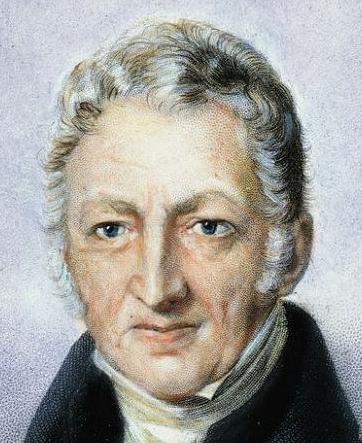 Since
the publication in 1798 of the book An Essay on the Principle of
Population by the English clergyman Robert Malthus, there was
considerable discussion in England about the problems created by a
rapidly expanding human population on the earth, the issues of hunger,
disease and war that this would produce. Consequently, by the
time of Darwin's 1859 publication, a number of leading political and
intellectual figures in England had already taken the social position
that the best thing to do about the rising number of English poor was –
by a process of natural de-selection – simply to let them maintain a
natural balance with their world by the thinning of their ranks through
hunger and disease. It was thus wise not to encourage their
expansion through unnecessary charity. Since
the publication in 1798 of the book An Essay on the Principle of
Population by the English clergyman Robert Malthus, there was
considerable discussion in England about the problems created by a
rapidly expanding human population on the earth, the issues of hunger,
disease and war that this would produce. Consequently, by the
time of Darwin's 1859 publication, a number of leading political and
intellectual figures in England had already taken the social position
that the best thing to do about the rising number of English poor was –
by a process of natural de-selection – simply to let them maintain a
natural balance with their world by the thinning of their ranks through
hunger and disease. It was thus wise not to encourage their
expansion through unnecessary charity.
Charles Lyell (1797-1875)
In the early 1800s, at the same time that biology was moving toward the
development of a theory of natural evolution, similar work was moving
ahead in the area of geology. The most notable figure behind this
work was Charles Lyell.
Lyell had developed an early curiosity about different earth formations
in England into a full-blown quest to give an explanation for the
layers of the soil that he observed within the country's cliffs and
mountains. On a trip to Italy in 1828-1829 where he studied Mt.
Etna, he came up with the idea that all these geological features
(mountains, valleys, islands, deserts, etc.) did not occur abruptly –
but were the process of gradual shifts (volcanos) and decay (erosion)
in the earth's surface ... taking place naturally over a very long
stretch of time, a process continuing even into the present.
Further study in Spain the next year led him during the period
1831-1833 to publish his 3-volume work, Principles of Geology.
Loaded with supportive data for his theory, the book was to make a
tremendous impact on his time.
Overall, Lyell presented a view of the earth as being both very old
(older than the calculus of those who reckoned the earth's age on the
basis of adding up the Genesis chronologies) – possibly even millions
of years old – and very much still in the process of becoming. To
him the earth was even to be looked upon as a living organism.
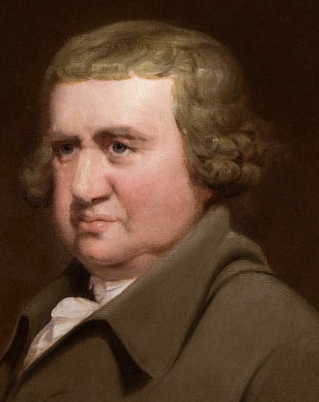 An earlier Darwin
An earlier Darwin
We
have already introduced Lamarck as a major part of this dynamic.
But it is also interesting to note that Lamarck was himself influenced
by Darwin's grandfather, Erasmus Darwin
(1731-1802), who in 1796 described in his publication Zoonomia how
species had developed slowly over the generations by their abilities to
pass on from generation to generation not only their basic traits, but
also useful alterations in those traits. Thus Erasmus's grandson
Charles Darwin came from a family already securely located in the
evolutionist camp!
Darwin himself
Then what Darwin achieved in his 1859 book On the Origin of Species
was to show through actual scientific analysis how living creatures on
this planet could have evolved slowly over an enormous expanse of time
from a small number of simpler forms into a vast array of much more
complex species. All of this could have been achieved entirely
through a natural or mechanical process by which the very competitive
nature of life rewarded the stronger offspring of any species the
better chance for survival, and the privilege of birthing a new
generation that retained that superiority. Eventually this
struggle for life – and its continuation from generation to generation
– would, over time, bring into existence a distinctly new, more complex
species, one better adapted to the complexities of life.
Thus every living creature we saw around us was naturally evolved from
a less complex ancestor by a process termed "natural selection."
In short, morally speaking, life was at its core simply a matter of the
survival of the fittest.
It was Darwin's Cambridge University teacher, John Henslow, who
arranged for Darwin in 1831 to sail on the British naval ship Beagle to
the South Pacific islands just off the coast of South America ... and
who urged him to take with him a copy of Lyell's Principles of Geology.
Lyell's vision of even the earth itself as a living, developing
organism touched Darwin's thoughts deeply. With this sense of a
dynamic earth in mind he thus came up with an unprecedented (and
correct) explanation of how coral atolls were formed out on the high
sea.
Nature cooperated in the process. While he was in Chile an
earthquake took place in which he actually observed the land rise in
front of him. Thus the concept of a dynamic earth was not merely
a theoretical one for him. He also observed strata of sea shells
in the mountains at a height of 12,000 feet, lifted over time from an
earlier position as a sea bed.
What he was doing was giving further support to Lyell's view of the
earth's natural life – support so extensive that the world of learned
scholars felt themselves forced to look upon the earth in this way from
this time on.
Upon his return to England in 1836 he was greeted easily as an
accomplished colleague by the scientific community. But he was
just getting started. His thoughts returned to the questions of
why life took the shape it did – which increasingly left God out of the
picture.
Darwin was not really a radical by nature, and for years kept his
thinking to himself. But he was thinking thoughts that he knew
would not be well greeted by many in his times, including his devoutly
Christian friend, Henslow.
Actually it was in 1842 that Darwin first drafted a brief version of
his theory and then two years later a full draft version – but was
unwilling to bring it before the public because of the furor he knew it
would stir. He would show it only to close friends such as Lyell
and Thomas Henry ("T.H.") Huxley. Finally in 1858 he was inspired
to act when he received a paper from Alfred Wallace, a botanist working
in the Malayan islands, a paper which pointed to the same hypothesis he
had been developing. His friends urged him to bring out his own
thoughts on the subject in a joint paper worked up with Wallace –
presented that summer. With this he was ready to bring out his
full work, On the Origin of Species by Means of Natural Selection, or The Preservation of Favoured Races in the Struggle for Life.
In November of 1859 he presented his first edition – which was bought
up immediately and quickly went to further editions (6 such editions
over the next 13 years). The English scientific community was
highly approving; the clergy were adamantly hostile, as he expected.
His friend Huxley only added fuel to the fire by extending the logic of
his friend's theories into the realm of social action, cultivating a
theory known as "Social Darwinism." It was Huxley who came up
with the idea that brutal competition in society or "survival of the
fittest," was a necessary part of the advance of mankind.
Darwin was himself not a proponent of this view – but soon became identified with it.
Other books by Darwin followed over the next years – the most important of which was The Descent of Man and Selection in Relation to Sex
(1871). Here he came out directly with what had only been implied
in his Origin, namely that even man himself was the by-product of the
evolutionary process, not only physically but also morally and
spiritually. This of course challenged the notion that man was a
very distinct part of the Creation process – but instead was merely
another, albeit a highly evolved, by-product of the on-going mechanism
of evolution. In 1872 he went a step further in his The Expression of the Emotions in Man and Animals,
stating the the emotions we attribute uniquely to man are in fact
shared in some less evolved ways with other members of the animal
kingdom.
Herbert Spencer
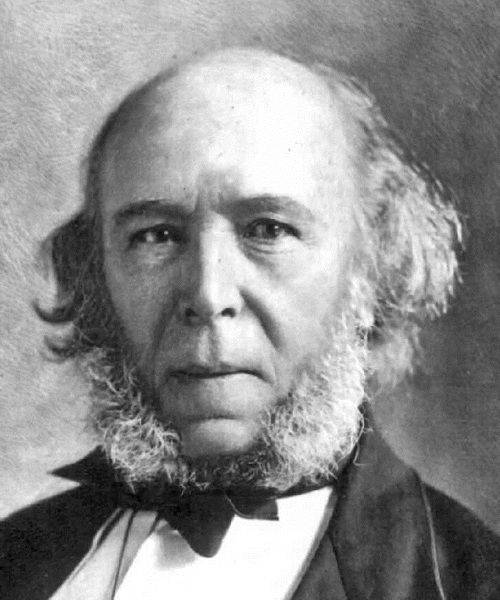 Darwinism was further buttressed by the writings
of other social philosophers of the day. Besides Darwin's pupil
Huxley, who actually coined the term "survival of the fittest,"
there was Huxley's friend Herbert Spencer (1820-1903), who had been moving in the
direction of Darwin's thinking even before Darwin published his first
work in 1859. Spencer had been working on both social theory (his
1851 Social Statistics) and personal development theory (his 1855
Principles of Psychology), his work heavily influenced not only by
Malthus but also by the theories of Lamarck. Then when Darwin's
work was published in 1859 Spencer came out full force in his support
of evolution as the basic doctrine of life, in every aspect of life on
earth. Darwinism was further buttressed by the writings
of other social philosophers of the day. Besides Darwin's pupil
Huxley, who actually coined the term "survival of the fittest,"
there was Huxley's friend Herbert Spencer (1820-1903), who had been moving in the
direction of Darwin's thinking even before Darwin published his first
work in 1859. Spencer had been working on both social theory (his
1851 Social Statistics) and personal development theory (his 1855
Principles of Psychology), his work heavily influenced not only by
Malthus but also by the theories of Lamarck. Then when Darwin's
work was published in 1859 Spencer came out full force in his support
of evolution as the basic doctrine of life, in every aspect of life on
earth.
Soon Spencer would even outdistance Darwin as the most recognized
philosopher of the late 1800s. But the very names Darwin and
Darwinism would still serve as the most powerful symbols able to raise
strong debate, pro and con, not only well into the 20th century but
still even today.
 The
German philosopher and writer Friedrich Nietzsche (1844-1900) was not exactly a
Darwinist, but certainly was – or would soon become – a voice of his
times, a period deeply steeped in the Darwinist mindset. In his
multi-volume series Also Sprach Zarathustra (Thus Spoke Zarathustra),
he gave the German culture the ideal of the bermensch – except that he
was referring to the highly achieved individual – not some racial
group, such as the Nazis would eventually use the term in reference to
the German people as a whole, seeing themselves as a superior
breed. Nietzsche was referring to the highly self-cultivated
individual who (reflective of Nietzsche's own personal struggles) had
come to put aside all other values (wealth, sex, even happiness) in
order to focus completely in meeting fully the high calling that fate
had placed on that person. Such a person strove to rise above the
mere animal call to life – to rise above ( ber) mere common existence
as a person (Mensch). The
German philosopher and writer Friedrich Nietzsche (1844-1900) was not exactly a
Darwinist, but certainly was – or would soon become – a voice of his
times, a period deeply steeped in the Darwinist mindset. In his
multi-volume series Also Sprach Zarathustra (Thus Spoke Zarathustra),
he gave the German culture the ideal of the bermensch – except that he
was referring to the highly achieved individual – not some racial
group, such as the Nazis would eventually use the term in reference to
the German people as a whole, seeing themselves as a superior
breed. Nietzsche was referring to the highly self-cultivated
individual who (reflective of Nietzsche's own personal struggles) had
come to put aside all other values (wealth, sex, even happiness) in
order to focus completely in meeting fully the high calling that fate
had placed on that person. Such a person strove to rise above the
mere animal call to life – to rise above ( ber) mere common existence
as a person (Mensch).
In fact, with respect to the ideal of the racial bermensch, he was
actually much opposed, getting himself in trouble with the German
authorities for his strong anti-nationalism. He even at one point
renounced his Prussian citizenship. No, Nietzsche was extolling
the powerful individual that he claimed should be directing human life
on this planet, not the group-think of the rising nationalist spirit
that he saw developing around him – one which would eventually lead
Europe into the disastrous national or tribal conflict known in its
time as the Great War and to us today as World War One (as well
as its continuation as World War Two a generation later).
He also was distinctly an atheist – informing the world that "God is
dead." He (like Marx) saw the Judeo-Christian religion as
offering humanity only enslavement to earthly commonness by teaching
people to aim not for greatness in this life – but instead to aim for
some supposed afterlife that Judeo-Christianity claimed awaited the
humble and faithful at death. Nietzsche was very emphatic in
stating that there was no evidence whatsoever that such a Heavenly life
actually existed.
THE ASSAULT ON CHRISTIAN MORALITY |
As
an Anglican clergyman, Malthus himself had, back in the late 1700s,
wrestled with the problem of why God would allow suffering to occur
within his creation. Malthus finally concluded that God wanted
man to rise to the challenge of life, to succeed in the face of life's
difficulties through the discipline of hard work. Those who fell
short of the challenge were simply some kind of disappointment to the
great Creator. Those who failed merely reaped that which they had
sown.1 This in essence was the British version of Sturm und Drang!
Malthus's explanation of course was a terrible reading of what the
founder of the Christian faith himself had taught the world.
Jesus put the challenge not in terms of natural selection, but quite
the opposite. According to Jesus, the challenge of life was to
find ways to help the poor in the face of the huge challenge of
survival in a competitive world of economics and politics. This
ability to do charity, when the opposite would be so much more
tempting, was for Jesus the measure of greatness of anyone in God's
kingdom.
At some point people were going to have to choose between the two,
Jesus or the Darwinists. The original Puritans had chosen Jesus, and
built an experimental society of mutual service among social equals
based precisely on the spiritual ethics of Jesus Christ. The
Virginians, not exactly Darwinists but of the same mindset, chose
instead personal success at the cost of others (the slaves). Thus
by the mid-1800s this was not a new issue. It is simply that Darwinism
finally gave aggressive selfishness the moral justification that an
increasingly aggressively selfish society seemed to require.
But Darwin himself, very sensitive to the importance of human charity
and mutual concern in human society, was quite aware of this ethical
matter, and actually troubled by how many were choosing to read cruel
ethical justification into his theories.
1It is truly amazing the extent to which man can go in rationalizing about God and God's intentions.
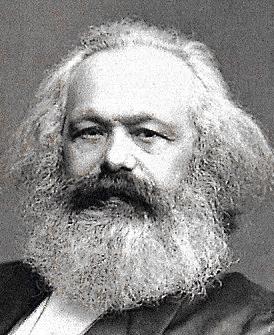 At
the same time that German (and other) social philosophers were
seeing in the fast-changing dynamic of their days the fulfillment
of history through the rise through struggle of the tribal nation
(France, Germany, Italy, etc.), German expatriate philosopher (in exile
in London) Karl Marx (1818-1883) headed down an entirely different road in his
explanation as to where history was headed. He saw history
fulfilled not in the struggle among nations but instead in the struggle
among economic classes, principally between the owners of wealth and
the subject classes (proletariat)2 that produced that wealth for the
owners through their labors. Marx was so insistent on this matter
that he actually despised nationalism and all the discussion going on
about nationalist struggles, seeing that as a distraction leading
people away from the real struggle that lay before them, the industrial
class struggle that was about to unfold – and lead the world into its
final stage in history. At
the same time that German (and other) social philosophers were
seeing in the fast-changing dynamic of their days the fulfillment
of history through the rise through struggle of the tribal nation
(France, Germany, Italy, etc.), German expatriate philosopher (in exile
in London) Karl Marx (1818-1883) headed down an entirely different road in his
explanation as to where history was headed. He saw history
fulfilled not in the struggle among nations but instead in the struggle
among economic classes, principally between the owners of wealth and
the subject classes (proletariat)2 that produced that wealth for the
owners through their labors. Marx was so insistent on this matter
that he actually despised nationalism and all the discussion going on
about nationalist struggles, seeing that as a distraction leading
people away from the real struggle that lay before them, the industrial
class struggle that was about to unfold – and lead the world into its
final stage in history.
The Hegelian dialectic applied to Marx's economic theory
In 1848 Marx published his famous 30-page Communist Manifesto in the hope of capitalizing on the spirit of political rebellion that was rocking continental Europe at that time.
His Manifesto outlined history
as a series of quite Hegelian dialectical struggles over time between
those who legally owned the land, tools, machinery (what Marx summed up
as social property or the "means of production") that produced the
wealth that the people of society lived off of, and the proletariat
who, though they owned none of those means of production, labored
physically in using those means of production to bring forward the
wealth that society lived off of. Typically in history, in the
distribution of the wealth that a society jointly created for its
survival and prosperity, most all of that wealth went to the class of
property owners, with very little making its way to the hands of the
proletarian workers.
This would bring tremendous tension to society,
which eventually would turn into physical conflict because of this
social injustice. Again, in Hegelian (and eventually Darwinian)
dialectical fashion, such conflict or class struggle would then move
history forward to a new, and better social system, shaped by the way
the opposing classes synthesized their social positions into a new
social structure.
Continuing his analysis in a further work, Das Kapital,3
he carefully described the situation around him in Europe where the
feudal system, once dominated by landed aristocrats, had been
challenged by a new social class of industrial and financial
capitalists, thus creating the age of capitalism. But he also saw
how capitalism in turn had created its own opposing social force in the
form of the industrial workers (the industrial proletariat) whose
labors supported the capitalist system. And he predicted that
conditions were quickly rising that would cause the industrial
proletariat in its turn to rise up against the capitalist class, and –
through the necessary historical conflict or revolution – open the way
to a new social system.
Time was on the side of the worker, because capitalism by its very
nature is highly competitive even among the capitalists themselves –
each capitalist trying to eliminate his competitors in order to gain
greater control over the market. This way they could increase
their profits, even establish total or monopolistic control over the
whole process. But of course as they drove each other out of
business, they were inadvertently thinning out their capitalist social
ranks, making their numbers smaller at the same time that the ranks of
the proletarian were growing. Thus simply the calculus of the few
against the many meant that the days of capitalism were numbered.
At that point (which supposedly was now upon them) all the proletariat
had to do was rise up and seize control of the means of production,
thus destroying the power of the capitalist class, and the public
government that had been protecting the capitalists. Thus in
rising up against their capitalist oppressors, they had "nothing to
lose but their chains."
A property-less, state-less, utopia
But, according to Marx, the resultant social system would be different,
it would be utopia itself. There would be no further class of
dominators or exploiters of the proletariat, because the new society
would be made up solely of industrial workers. There would be no
other class of people in the new society but this one single industrial
class. Everyone would now live as social equals – as comrades,
rather than as a two-class system of gentlemen lording it over a
servant class. Being equals, all would live communally, as in all land,
tools and machines being owned jointly by all – and by nobody in
particular.
Consequently, there would be no need for the political enforcing agency
of the state or government. It would simply wither away, because
the sole purpose of the state was to protect the interests of the
privileged class of property owners, whether feudal, capitalist or
whatever. In the communist society there would be no personal
property, thus no state. Something like a Rousseauian bliss would
then hold this happy world together.
Communism as the last stage of history
Also, the new society would end the long historical dialectic of a
ruling class and a proletariat class finding themselves once again in
conflict. With no division under communism between a propertied
class and a proletarian class, there would be no cause for social
conflict, no tension, no stress, only blissful peace. Thus this
last historical revolution would bring history to a completion, the
kind of millennialist completion that everyone was expecting because of
the unprecedented progress they had been observing coming forth at
mind-boggling speed. All history was supposedly about to fulfill
itself, and Marx was showing how that was to be accomplished.
All very scientific
This was all pretty powerful stuff. And it appealed to the
interests not only of European industrial workers, but also to
intellectual Progressivists – not only in Europe but also in
America. Marx's theories seemed to be irrefutable because they
were built on hard fact. Unlike the philosophical speculations of
social philosophers before him, but quite like Darwin, Marx had thrown
a lot of data into his analysis, supposedly hard economic data, thus
qualifying his theory as "scientific socialism," making him – and those
who followed his lead – "scientific socialists."
Marx's militant atheism
As all materialists or mechanists, Marx had no need of the concept of
God, or some divine hand driving forward the economic process he had
outlined. It all worked – similar to Darwin's theories – entirely
mechanically. Marx personally was an atheist. In fact he
was quite opposed to the Christian religion, or any religion that saw
history shaped and judged by a Supreme Being. As for
Christianity, he saw the religion simply as a cruel psychological tool
used by Europe's ruling classes (most lately the capitalists) that
savagely exploited their own servants or workers, by excusing their
horrible treatment of the workers under the promise that if the
oppressed workers all cooperated with the system and behaved themselves
(not rebel against their oppressors) they would be rewarded in the next
life with heaven. To Marx, such religious theory was only a form
of spiritual opium given to the masses to keep them docile.
The spread of Marxism among Europe's intellectuals
Meanwhile, as Europe headed into the Twentieth Century, clearly a
growing number of social and political philosophers were convinced
that, through some kind of Darwinian process, Western civilization
(and, via the West, also world civilization as well) was moving into a
bright future in which utopian existence for all – even (and
especially) the unwashed masses – seemed to loom into view.
Society just needed some adjustments here and there – led of course by
these political philosophers or social scientists – in order to bring
this process to completion. "Historical progress" and "democracy"
– however conceived specifically (and the variation was indeed huge)
were the bywords, the slogans, the shibboleths, of those who supposed
that they possessed special intellectual insights into where the world
was headed.
Within that group of Western social reformers was a large group of
Marxist ideologues and political activists – forming the Social
Democratic Party in a number of European countries – whose expectations
were that Marx's Communist revolution would soon break out across
Europe. This supposedly would occur naturally first in a society
experiencing the most advanced state of capitalism, probably Great
Britain or Germany. After all, Marx's scientific socialism would
not work except under the historical circumstances he had so carefully
described. Every stage of historical development had to be
completed before history would be ready to move on to the next step or
phase in its development. The dialectical method demanded that
kind of historical precision.
2A
term drawn from Roman times in reference to the members of the Roman
working class who held little or no property and thus few or no
political rights.
3Marx
was a prolific writer ... who found getting his work published
difficult because of the opposition it always faced from the
authorities. Of his multi-volume Das Kapital, the first volume
would be published in 1867. Additional volumes would be published
by his friend Friedrich Engels after Marx's death in 1883: volume
two in 1885 and volume three in 1894.

Go on to the next section: The West Since 1850: An Introduction
 Miles
H. Hodges Miles
H. Hodges
| | | | | | | | |


 Jeremy Bentham
Jeremy Bentham
 The assault on Christian morality
The assault on Christian morality





 Bentham's Utilitarianism.
Bentham's Utilitarianism. The
Frenchman Auguste Comte (1798-1857) reacted to the sometimes wild
speculation of French rationalists, who during the previous century had
built their philosophical theories on "reasonable" propositions –
rather than on the observation of actual phenomena. In short, he
introduced British empiricism to French or continental philosophy,
terming his approach "positivism."
The
Frenchman Auguste Comte (1798-1857) reacted to the sometimes wild
speculation of French rationalists, who during the previous century had
built their philosophical theories on "reasonable" propositions –
rather than on the observation of actual phenomena. In short, he
introduced British empiricism to French or continental philosophy,
terming his approach "positivism." Mill
(1806-1873) was an amazing child prodigy, reading classic Greek
literature (from Aesop to Plato) by age 8, then a full array of Latin
and Greek works by age 10 ... plus history, math, physics and
astronomy. In all of this, he was carefully "home schooled" –
pruned and protected in his infancy and youth by his father, James Mill
– in order that the son would be "associated" only with the sharpest
minds (his father's and that of the family friend Jeremy Bentham) ...
and not with lower social orders of his own age ... a key part of the
educational philosophy of the British "Positivist" movement. His
father's goal was to grow his son into "a bright light of Utilitarian
philosophy that might light the world." In part the father
succeeded, though at a deeply heavy emotional and spiritual cost to the
son.
Mill
(1806-1873) was an amazing child prodigy, reading classic Greek
literature (from Aesop to Plato) by age 8, then a full array of Latin
and Greek works by age 10 ... plus history, math, physics and
astronomy. In all of this, he was carefully "home schooled" –
pruned and protected in his infancy and youth by his father, James Mill
– in order that the son would be "associated" only with the sharpest
minds (his father's and that of the family friend Jeremy Bentham) ...
and not with lower social orders of his own age ... a key part of the
educational philosophy of the British "Positivist" movement. His
father's goal was to grow his son into "a bright light of Utilitarian
philosophy that might light the world." In part the father
succeeded, though at a deeply heavy emotional and spiritual cost to the
son. When
in 1859 Charles Darwin (1809-1882) published his book,
When
in 1859 Charles Darwin (1809-1882) published his book, 



 At
the same time that German (and other) social philosophers were
seeing in the fast-changing dynamic of their days the fulfillment
of history through the rise through struggle of the tribal nation
(France, Germany, Italy, etc.), German expatriate philosopher (in exile
in London) Karl Marx (1818-1883) headed down an entirely different road in his
explanation as to where history was headed. He saw history
fulfilled not in the struggle among nations but instead in the struggle
among economic classes, principally between the owners of wealth and
the subject classes (proletariat)
At
the same time that German (and other) social philosophers were
seeing in the fast-changing dynamic of their days the fulfillment
of history through the rise through struggle of the tribal nation
(France, Germany, Italy, etc.), German expatriate philosopher (in exile
in London) Karl Marx (1818-1883) headed down an entirely different road in his
explanation as to where history was headed. He saw history
fulfilled not in the struggle among nations but instead in the struggle
among economic classes, principally between the owners of wealth and
the subject classes (proletariat)
